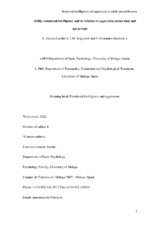Ability emotional intelligence and its relation to aggression across time and age groups
Autor
García‑Sancho, Esperanza
Salguero, J. Martín
Fernández-Berrocal, Pablo
Editor
WileyFecha
2016Materia
Emotional intelligenceAggression
Longitudinal
Personality
METS:
Mostrar el registro METSPREMIS:
Mostrar el registro PREMISMetadatos
Mostrar el registro completo del ítemResumen
Emotional intelligence (EI) has been associated with several indicators of psychosocial adjustment, including aggressive behavior, but the relevant research has been mostly cross-sectional, focused on adults, and limited to trait EI measures (Mayer, Roberts, & Barsade, 2008; García-Sancho, Salguero, Fernández-Berrocal, 2014). The present work explored the relationship between Ability Emotional Intelligence (AEI) and aggression in both adults and adolescents using cross-sectional and longitudinal designs. We conducted two studies. Study 1 aimed to provide preliminary evidence about the relationship between AEI and aggression in adults. As literature has shown personality traits act as a strong predictor of aggression, study 1 also examined the potential incremental validity of AEI beyond personality traits in 474 undergraduate students (M =22.76, SD=5.13). The results indicated AEI explains a significant amount of unique variance for physical aggression, but not for verbal aggression after controlling personality traits. Study 2 aimed a longitudinal analysis of the relationship between EI and aggression in 151 adolescents (M=14.74, SD= .84). AEI predicted physical aggression over time, but it did not predict verbal aggression. Results from both studies suggest a negative and significant relationship between AEI and physical aggression, however contrary our expectations, it did not for verbal aggression. These results highlight the important explanatory role of emotional abilities in physical aggressive conducts and the implications of these findings are discussed.

